Related Research Articles
A horse breed is a selectively bred population of domesticated horses, often with pedigrees recorded in a breed registry. However, the term is sometimes used in a broader sense to define landrace animals of a common phenotype located within a limited geographic region, or even feral "breeds" that are naturally selected. Depending on definition, hundreds of "breeds" exist today, developed for many different uses. Horse breeds are loosely divided into three categories based on general temperament: spirited "hot bloods" with speed and endurance; "cold bloods," such as draft horses and some ponies, suitable for slow, heavy work; and "warmbloods," developed from crosses between hot bloods and cold bloods, often focusing on creating breeds for specific riding purposes, particularly in Europe.

The guinea pig or domestic guinea pig, also known as the cavy or domestic cavy, is a species of rodent belonging to the genus Cavia in the family Caviidae. Breeders tend to use the word cavy to describe the animal, while in scientific and laboratory contexts, it is far more commonly referred to by the common name guinea pig. Despite their common name, guinea pigs are not native to Guinea, nor are they closely related biologically to pigs, and the origin of the name is still unclear. They originated in the Andes of South America. Studies based on biochemistry and hybridization suggest they are domesticated animals that do not exist naturally in the wild, descendants of a closely related cavy species such as C. tschudii. They were originally domesticated as livestock for a source of meat, and are still consumed in some parts of the world.

A dog breed is a particular strain of dog that was purposefully bred by humans to perform specific tasks, such as herding, hunting, and guarding. Dogs are the most variable mammal on earth, with artificial selection producing around 450 globally recognized breeds. These breeds possess distinct traits related to morphology, which include body size, skull shape, tail phenotype, fur type, body shape, and coat colour. Their behavioural traits include guarding, herding, and hunting, and personality traits such as hypersocial behavior, boldness, and aggression. Most breeds were derived from small numbers of founders within the last 200 years. As a result, today dogs are the most abundant carnivore species and are dispersed around the world.

The Australian National Kennel Council (ANKC) is the coordinating kennel club of Australia. The ANKC is a member of the Fédération Cynologique Internationale.

The Kennel Club ("KC") is the official kennel club of the United Kingdom. It is the oldest recognised kennel club in the world. Its role is to oversee various canine activities including dog shows, dog agility and working trials. It also operates the national register of pedigree dogs in the United Kingdom and acts as a lobby group on issues involving dogs in the UK. Its headquarters are on Clarges Street in Mayfair, London, with business offices in Aylesbury.
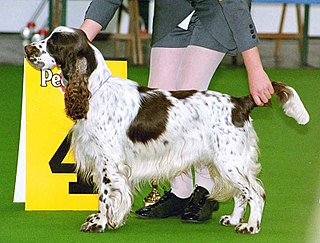
A dog show is an event where dogs are exhibited. A conformation show, also referred to as a breed show, is a kind of dog show in which a judge, familiar with a specific dog breed, evaluates individual purebred dogs for how well the dogs conform to the established breed type for their breed, as described in a breed's individual breed standard.
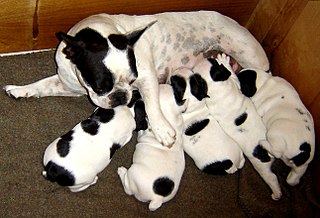
Dog breeding is the practice of mating selected dogs with the intention of maintaining or producing specific qualities and characteristics. When dogs reproduce without such human intervention, their offspring's characteristics are determined by natural selection, while "dog breeding" refers specifically to the artificial selection of dogs, in which dogs are intentionally bred by their owners. Breeding relies on the science of genetics, hence a breeder who is knowledgeable on canine genetics, health, and the intended purpose of the dogs attempts to breed suitable dogs.

The Cat Fanciers' Association (CFA) was established in the United States in 1906. The CFA is currently the world's largest registry of pedigreed cats and known as the most prestigious pedigreed cat registering association in North America. Originally headquartered in Manasquan, New Jersey the CFA moved to Alliance, Ohio in 2010. The association's stated mission is preserving and promoting pedigreed breeds of cats while also enhancing the well-being of all cats. CFA's first licensed cat shows were held in Buffalo, New York and Detroit, Michigan in 1906. The association today has a known presence in Europe, China, and Japan along with its well-established activity in the United States and Canada.

Crufts is an international dog show held annually in the United Kingdom, first held in 1891. Organised and hosted by The Kennel Club, it is the largest show of its kind in the world.
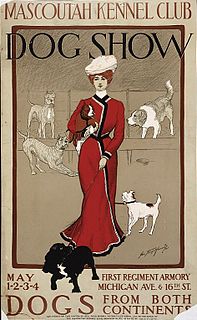
A kennel club is an organization for canine affairs that concerns itself with the breeding, showing and promotion of more than one breed of dog. Kennel clubs became popular in the mid 19th century. All-encompassing kennel clubs are also referred to as 'all-breed clubs', although "all" means only those breeds that they have decided to recognize, and "breed" means purebred dogs, not including dog hybrids and crossbreeds or mixed-breed dogs. A club that handles only one breed is known as a breed club.
Purebreds are "cultivated varieties" of an animal species achieved through the process of selective breeding. When the lineage of a purebred animal is recorded, that animal is said to be "pedigreed". Purebreds breed true-to-type which means the progeny of like-to-like purebred parents will carry the same phenotype, or observable characteristics of the parents. A group of purebreds is called a pure-breeding line or strain.

The New Forest pony is one of the recognised mountain and moorland or native pony breeds of the British Isles. Height varies from around 12 to 14.2 hands ; ponies of all heights should be strong, workmanlike, and of a good riding type. They are valued for hardiness, strength, and sure-footedness.
A breed registry, also known as a herdbook, studbook or register, in animal husbandry and the hobby of animal fancy, is an official list of animals within a specific breed whose parents are known. Animals are usually registered by their breeders while they are young. The terms studbook and register are also used to refer to lists of male animals "standing at stud", that is, those animals actively breeding, as opposed to every known specimen of that breed. Such registries usually issue certificates for each recorded animal, called a pedigree, pedigreed animal documentation, or most commonly, an animal's "papers". Registration papers may consist of a simple certificate or a listing of ancestors in the animal's background, sometimes with a chart showing the lineage.
In agriculture and in the hobby of animal fancy, a breeder is an individual animal used for selective breeding. A breeder is usually a purebred animal, bred with the intent of producing purebred, or even show-quality animals. However, in some cases, a breeding animal is crossbred with another breed or a mixed breed with the intent of combining aspects of two or more different breeds.
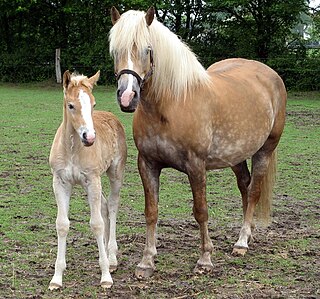
The Haflinger, also known as the Avelignese, is a breed of horse developed in Austria and northern Italy during the late 19th century. Haflinger horses are relatively small, are always chestnut with flaxen mane and tail, have distinctive gaits described as energetic but smooth, and are well-muscled yet elegant. The breed traces its ancestry to the Middle Ages; several theories for its origin exist. Haflingers, developed for use in mountainous terrain, are known for their hardiness. Their current conformation and appearance are the result of infusions of bloodlines from Arabian and various European breeds into the original native Tyrolean ponies. The foundation sire, 249 Folie, was born in 1874; by 1904, the first breeders' cooperative was formed. All Haflingers can trace their lineage back to Folie through one of seven bloodlines. World Wars I and II, as well as the Great Depression, had a detrimental effect on the breed, and lower-quality animals were used at times to save the breed from extinction. During World War II, breeders focused on horses that were shorter and more draft-like, favored by the military for use as packhorses. The emphasis after the war shifted toward animals of increased refinement and height.
A cat registry or cat breed registry, also known as a cat fancier organization, cattery federation, or cat breeders' association, is an organization that registers domestic cats of many breeds, for exhibition and for breeding lineage tracking purposes. A cat registry stores the pedigrees (genealogies) of cats, cattery names, and other details of cats; studbooks, breed descriptions, and the formal breed standards ; lists of judges qualified to judge at shows run by or affiliated with that registry, and sometimes other information. A cat registry is not the same as a breed club or breed society. Cat registries each have their own rules and usually also organize or license (sanction) cat shows. The show procedures vary widely, and awards won in one registry are not normally recognized by another. Some registries only serve breeders, while others are oriented toward pet owners and provide individual as well as cattery memberships, while yet others are federations only deal with breed clubs or even other registries as intermediaries between the organization and breeders.

The Thoroughbred is a horse breed best known for its use in horse racing. Although the word thoroughbred is sometimes used to refer to any breed of purebred horse, it technically refers only to the Thoroughbred breed. Thoroughbreds are considered "hot-blooded" horses that are known for their agility, speed, and spirit.
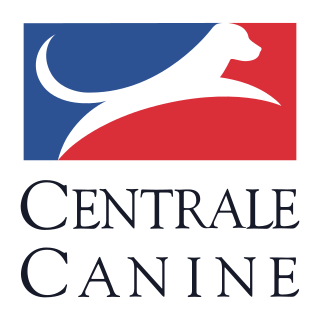
The Société centrale canine, officially the Société Centrale Canine pour l'Amélioration des Races de Chiens en France and abbreviated SCC, is a French kennel club founded in 1881. It is made up of regional clubs and breed clubs, and coordinates and regulates activities and connections between governmental groups and dog clubs, as well as activities through the Fédération cynologique internationale, where it was one of the original five founding member organizations in 1911.

A part-Arabian, partbred Arabian or, less precisely, half-Arabian, is a horse with documented amounts of Arabian horse breeding but not a purebred. Because the Arabian is deemed to be a breed of purebred horse dating back many centuries, the modern breed registries recognized by the World Arabian Horse Organization generally have tightly closed stud books which exclude a horse from registration if it is found to contain any outside blood. However, Arabian breeding has also been used for centuries to add useful traits to countless other horse breeds. In the modern era, crossbreeding has been popular to combine the best traits of two different breeds, such as color, size, or ability to specialize in a particular equestrian discipline.
References
- ↑ "British Cavy Council". www.britishcavycouncil.org.uk. Retrieved 2020-03-04.
- ↑ Galen. "Cavy Breeders, Clubs & Shows - Galens Garden". Galens Garden. Retrieved 2020-03-04.
- ↑ "Welcome to the Southern Cavy (guinea pigs) Club". Southern Cavy Club. Retrieved 2020-03-04.
- ↑ "Home". National Cavy Club. 2017-08-31. Retrieved 2020-03-04.
- ↑ "Scottish National Cavy Club". Scottish National Cavy Club. Retrieved 2020-03-04.
- ↑ "British Cavy Council - constitution and rules". www.britishcavycouncil.org.uk. Retrieved 2020-03-04.